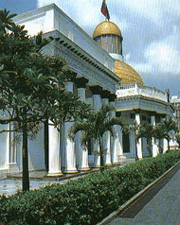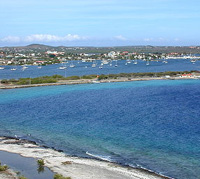委内瑞拉首都--加拉加斯
(单词翻译:单击)
Caracas (Venezuela)
 The capital of Venezuela is a huge, vibrant1 and energetic city built on tremendous wealth and desperate poverty. Gravity is equally defied by the city's thrusting towers of steel and glass and the teetering(摇摇欲坠的)shantytowns(简陋的棚屋)that cover the city's surrounding hills.
The capital of Venezuela is a huge, vibrant1 and energetic city built on tremendous wealth and desperate poverty. Gravity is equally defied by the city's thrusting towers of steel and glass and the teetering(摇摇欲坠的)shantytowns(简陋的棚屋)that cover the city's surrounding hills.
As cosmopolitan2 and captivating as it can be depressing, Caracas has all the assets of a big city - great restaurants, plush hotels(豪华饭店), theatre, museums, nightlife, shopping - and many of the problems - petty crime, grinding poverty, pollution and the loss of heritage.
It's an oil-money place of traffic jams and progressive culture, the unquestioned centre of the country's political, scientific, cultural, intellectual and educational life. It's a showcase of modern architecture, flaunting3 public sculptures, mosaics4 and murals at every turn. It enjoys a perfect position on the Caribbean coast, and is the gateway5 to the Andes(安第斯山脉)and the Amazon(亚马逊河).
Any time is a fine time to visit Caracas. The city enjoys a dry climate and temperatures are mild and steady. Venezuelans go on a whirlwind visitation of friends and family at Christmas, Carnaval and Easter, so avoiding the resulting transport and accommodation mayhem could be a factor in deciding when to visit.
The city of Caracas dates back to 1560, when intrepid6 Francisco Fajardo headed south from the Spanish colony on Isla de Margarita(马格丽塔岛), 40km (25mi) offshore7, and discovered the verdant8 valley that is today entirely9 taken up by the massive metropolis10. Fajardo founded a settlement called San Francisco, but the Toromaima Indians who lived in the valley objected to the Spaniards' incursions. For six years the Indians launched a series of attacks against the settlement, and the governor of the province responded by ordering the complete conquest of the valley. On July 25, 1567, the governor's expeditionary troop(远征队)decisively overcame Indian resistance and reestablished the settlement, naming it Santiago de León de Caracas: 'Santiago' after the patron saint(守护神)of Spain, 'León' after the provincial11 governor, and 'Caracas' after the coastal12 region's least troublesome Indian group.
 Caracas was elected as the administrative13 seat of the colony in 1577, becoming the third and final capital of Venezuela. Twenty years after its establishment, Caracas consisted of 60 families and ranged for 25 blocks surrounding the Plaza14 Mayor. Development was hindered by constant setbacks: pirate attacks left the city sacked and razed15, and subsequent reconstruction16 was destroyed by earthquake.
Caracas was elected as the administrative13 seat of the colony in 1577, becoming the third and final capital of Venezuela. Twenty years after its establishment, Caracas consisted of 60 families and ranged for 25 blocks surrounding the Plaza14 Mayor. Development was hindered by constant setbacks: pirate attacks left the city sacked and razed15, and subsequent reconstruction16 was destroyed by earthquake.
Caracas consolidated17 its position over the next two centuries, and the city gave birth to two of Venezuela's most famous sons: Francisco Miranda, who paved the way for independence, was born in 1750; and Simón 'El Libertador' Bolívar, who realized Miranda's dream, was born in 1783. Miranda was involved in the 1810 denouncing of the Spanish governor, and the formation of a replacement18 Supreme19 Junta20. Following a year-long political struggle, Venezuela's independence was declared on July 5, 1811, but Spain didn't recognize Venezuela's sovereignty until 1845.
Since the 1950s, Caracas' population has soared from around 400,000 to almost five million. The city suffered a severe economic decline in the 1980s and 90s, and the thousands of rural dwellers21 who rushed to find wealth in the big metropolis now lead a precarious(不稳定的)hand-to-mouth existence in the ramshackle huts that cover the steep hills surrounding the city center. Theft and armed robbery are increasingly a fact of life. Worse was to come on December 15, 1999, when disastrous22 mudslides(泥石流)devastated a 100km (62mi) swathe of the Litoral Central, the coastal area just north of Caracas. The exceptionally high rainfall that caused the disaster is estimated to occur only once in a thousand years in this region. Believed to be South America's worst natural disaster in recent memory, the mudslides killed between 30 and 50 thousand people, and made 150,000 homeless. Entire beaches and shantytowns vanished, the colonial town of La Guaira - once the region's major cultural sight - was destroyed, and the resorts are now ruined ghost towns.
 收听单词发音
收听单词发音
1
vibrant

|
|
| adj.震颤的,响亮的,充满活力的,精力充沛的,(色彩)鲜明的 | |
参考例句: |
|
|
|
2
cosmopolitan

|
|
| adj.世界性的,全世界的,四海为家的,全球的 | |
参考例句: |
|
|
|
3
flaunting

|
|
| adj.招摇的,扬扬得意的,夸耀的v.炫耀,夸耀( flaunt的现在分词 );有什么能耐就施展出来 | |
参考例句: |
|
|
|
4
mosaics

|
|
| n.马赛克( mosaic的名词复数 );镶嵌;镶嵌工艺;镶嵌图案 | |
参考例句: |
|
|
|
5
gateway

|
|
| n.大门口,出入口,途径,方法 | |
参考例句: |
|
|
|
6
intrepid

|
|
| adj.无畏的,刚毅的 | |
参考例句: |
|
|
|
7
offshore

|
|
| adj.海面的,吹向海面的;adv.向海面 | |
参考例句: |
|
|
|
8
verdant

|
|
| adj.翠绿的,青翠的,生疏的,不老练的 | |
参考例句: |
|
|
|
9
entirely

|
|
| ad.全部地,完整地;完全地,彻底地 | |
参考例句: |
|
|
|
10
metropolis

|
|
| n.首府;大城市 | |
参考例句: |
|
|
|
11
provincial

|
|
| adj.省的,地方的;n.外省人,乡下人 | |
参考例句: |
|
|
|
12
coastal

|
|
| adj.海岸的,沿海的,沿岸的 | |
参考例句: |
|
|
|
13
administrative

|
|
| adj.行政的,管理的 | |
参考例句: |
|
|
|
14
plaza

|
|
| n.广场,市场 | |
参考例句: |
|
|
|
15
razed

|
|
| v.彻底摧毁,将…夷为平地( raze的过去式和过去分词 ) | |
参考例句: |
|
|
|
16
reconstruction

|
|
| n.重建,再现,复原 | |
参考例句: |
|
|
|
17
consolidated

|
|
| a.联合的 | |
参考例句: |
|
|
|
18
replacement

|
|
| n.取代,替换,交换;替代品,代用品 | |
参考例句: |
|
|
|
19
supreme

|
|
| adj.极度的,最重要的;至高的,最高的 | |
参考例句: |
|
|
|
20
junta

|
|
| n.团体;政务审议会 | |
参考例句: |
|
|
|
21
dwellers

|
|
| n.居民,居住者( dweller的名词复数 ) | |
参考例句: |
|
|
|
22
disastrous

|
|
| adj.灾难性的,造成灾害的;极坏的,很糟的 | |
参考例句: |
|
|
|




